Carl E. Olson's Blog, page 97
May 12, 2014
A “Preacher of Peace” Amid Conflict: A CWR interview with His Beatitude, Sviatoslav Shevchuk
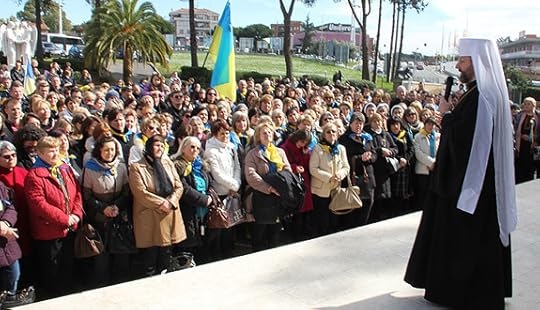
Major Archbishop Sviatoslav Shevchuk addresses the faithful in front of Santa Sofia in Rome during the weekend of April 26-27. (Photo courtesy of author)
A “Preacher of Peace” Amid Conflict | Brett R. McCaw | CWR
An interview with His Beatitude, Sviatoslav Shevchuk, Head of the Ukrainian Greek Catholic Church
At age 44, Major Archbishop Sviatoslav Shevchuk leads the Ukrainian Greek Catholic Church, the largest Eastern Church in communion with Rome. Having previously served as a seminary rector in L’viv and then as bishop for Ukrainian Greek Catholics in Argentina, Shevchuk was selected to be head of the Ukrainian Greek Catholic Church in March of 2011. A skilled polyglot (he is fully conversant in English, Russian, Italian, Modern Greek, Polish, Italian, and Spanish) and a dynamic pastor, Shevchuk has emerged as a foremost moral and religious voice within a nation mired in political crisis. During his stop in Rome to participate in the canonization ceremony of Popes John XXIII and John Paul II, Shevchuk paused to reflect on Ukraine’s Maidan movement, ongoing tensions with Russia, and ecumenism with the Russian Orthodox Church.
CWR: Your Beatitude, priests and bishops of your church have been visibly present in both the Orange Revolution of 2005 and in the Ukrainian Maidan movement earlier this year. In general, how would you describe the role of your church in the renewal of post-Soviet Ukrainian society.
Major Archbishop Shevchuk: First of all, I would like to underline that the whole phenomenon of the Maidan was a bit of a surprise for everybody—even the Church. This was because it was an appearance of civil society in Ukraine whose existence was debated for decades. Moreover, many wondered whether the Ukrainian people were able to peacefully stand together for a European future for their country on the basis of such values as rule of law, rejection of corruption, abhorrence of violence, and intolerance of authoritarian behavior. Many scholars would analyze the situation in Ukraine and would say that Ukrainians were not able to realize such a movement. Nevertheless, that European project became the project of social development in Ukraine and the churches helped to develop this. Last year, before the Maidan movement, the Ukrainian Council of Churches visited Brussels twice and sent several appeals to Ukrainian society concerning the discussion of European values. As churches, we were involved in promoting that discussion and were trying to be, as a church, part of civil society in order to awaken the people. To help them undertake their responsibility for their own country. Not only government or politicians have responsibility, but each, individual citizen.
No one expected that when our president suddenly changed his mind, such a large protest would emerge. So we as a church, as the churches—we did not call the people to protest. We were not those who would encourage such a protest. Yet we followed our people, because we recognized that those people were standing at the Maidan for those values, which we were promoting. If people take a stand for human dignity, rule of law, rejection of violence and corruption—we as a Church have a duty to recognize the moral power of such claims. It is why churches, not just the Ukrainian Greek Catholic Church, but Orthodox, Protestant, as well as Jewish and Muslim communities, were all present with their people on the Maidan. In some way, the people were leading us. For those three months, we were trying to be with our people and to keep the protest peaceful. I felt I needed to be a “preacher” of peace in order to reach the goals of the Maidan and emphasize peaceful methods were always more powerful and transformative in society than any other form of demonstration.
CWR: In mid-March, Fr. Mykola Kvych, a Ukrainian Greek Catholic priest and chaplain to the Ukrainian navy in Crimea was kidnapped and interrogated by Russian militants. In light of the Russian annexation of Crimea, what is the situation of the Ukrainian Greek Catholic parishes on the Crimean territory? What do you foresee for your church there in the coming years under Russian occupation?
May 11, 2014
Saint Peter, the leader of the choir, the ardent lover of Christ
A Scriptural Reflection on the Readings for May 11th, the Fourth Sunday of Easter | Carl E. Olson
Readings:
• Acts 2:14a, 36-41
• Ps 23:1-2a, 3b-4, 5, 6
• 1 Pet 2:20b-25
• Jn 10:1-10
It would be difficult to find a more eloquent tribute to Saint Peter than that written by St. John Chrysostom: “Peter, the leader of the choir, the mouth of all the apostles, the head of that tribe, the ruler of the whole world, the foundation of the Church, the ardent lover of Christ.”
The Year A readings during the Easter season focus on Peter, first, in recounting his great sermons and deeds as recorded in the first half of the Acts of the Apostles and, secondly, in his own words from his first epistle. One of the reasons for this is so we might contemplate the essential role of Peter, the first pope and Vicarius Christi (Vicar of Christ), in the early Church. And in hearing about Peter’s role, we can also better appreciate the nature and purpose of the papacy—not only in the ancient Church but certainly today as well .
The Catholic Church teaches that Jesus Christ formed the New Israel, the Church, by first calling together the Twelve, of which Peter was the head. Simon Peter alone was given the keys to the Kingdom (Matt 16:16-20) and established as “shepherd of the whole flock” (Catechism of the Catholic Church, 880-81). He, along with the other apostles, was given a unique and foundational authority by the Lord to teach, to govern, and to sanctify.
These three tasks are evident in today’s first reading, which is part of Peter’s sermon on the day of Pentecost and a description of the response to it.
Peter’s proclamation was an act of teaching, concentrated on the person of his Master: “Let the whole house of Israel know for certain that God has made both Lord and Christ, this Jesus whom you crucified.” Some scholars and critics have, especially in recent decades, sought to pit Peter against Paul, as if they were competitors or even bearers of conflicting messages. But the core of each of the two great apostles’ teaching was identical: “but we preach Christ crucified, a stumbling block to Jews and folly to Gentiles” (1 Cor 1:23; see 1 Cor. 2:2). As Peter wrote in his first epistle, Christ “himself bore our sins in his body upon the cross” (1 Pet 2:24).
Secondly, we see that Peter, as head of the other eleven apostles, guided and governed the administration of the sacraments: “Repent and be baptized, every one of you…” While some Fundamentalist Protestants argue that the papacy and holy orders obscure or even undermine the saving work of Christ, the opposite is the case. Even in its embryonic form, the hierarchy of the Church on the day of Pentecost made certain that the shared goal of bringing the supernatural gift of baptism to those present would take place in an orderly, understandable manner. It’s all well and good to rail against “organized religion”, but disorganized religions usually consist of a single adherent and a short life span.
Finally, the baptizing of three thousand on that day was a sanctifying action of the Holy Spirit, who worked in and through the saving sacraments of the Church. Peter knew that salvation comes by the Cross, as he wrote to the early Christians: “By his wounds you have been healed.” He also knew that Satan seeks to pit a false understanding of Jesus Christ against the truth of the Cross. It was Peter, after all, who upon hearing Jesus speaking prophetically of his approaching death, exclaimed, “God forbid, Lord! This shall never happen to you.” How could he forget the Lord’s quick rebuke: “Get behind me, Satan! You are a hindrance to me; for you are not on the side of God, but of men” (Matt 16:22-23)?
Peter was indeed a shepherd, the first pope. But he knew, as a man who like a lost sheep had gone astray in the dark of night, that his authority to shepherd came from “the shepherd and guardian of your souls”.
(This "Opening the Word" column originally appeared in the May 15, 2011, edition of Our Sunday Visitor newspaper.)
May 10, 2014
Pope Francis said what about the redistribution of money!?

Pope Francis shakes hands with United Nations Secretary General Ban Ki-moon during a meeting at the Vatican May 9. (CNS photo/L'Osservatore Romano via EPA)
Carl E. Olson | CWR blog
Perhaps you've already heard the news that Pope Francis is a socialist and Marxist, a rumor that was finally established as truth in his address yesterday to the United Nations System Chief Executives Board for Coordination (or, as call it in our family, the "UNSCEBFC"). Perhaps you've read the speech; perhaps you haven't.
Whatever the case, here's a fun little exercise: identify the pontiff's statement about redistribution from the following texts:
1) "The principle of solidarity, in a wide sense, must inspire the effective search for appropriate institutions and mechanisms, whether in the sector of trade, where the laws of healthy competition must be allowed to lead the way, or on the level of a wider and more immediate redistribution of riches and of control over them, in order that the economically developing peoples may be able not only to satisfy their essential needs but also to advance gradually and effectively."
2) "Peace, however, is not merely a gift to be received: it is also a task to be undertaken. In order to be true peacemakers, we must educate ourselves in compassion, solidarity, working together, fraternity, in being active within the community and concerned to raise awareness about national and international issues and the importance of seeking adequate mechanisms for the redistribution of wealth, the promotion of growth, cooperation for development and conflict resolution. “Blessed are the peacemakers, for they shall be called sons of God”, as Jesus says in the Sermon on the Mount (Mt 5:9)."
3) Every contract is a human matter, conducted by people and directed towards serving people. Only then will the market forces, set up, and periodically revised and diversified, be able to play their beneficial role: for they will function under the responsibility of individuals and peoples who are free, equal and linked by solidarity, and under the regulation of moral norms that are binding upon everybody. Healthy competition of this sort is in its turn conditioned by 'a wider and more immediate redistribution of riches and of control over them' ... . It is thus in this perspective that one must clarify and resolve the painful problem of the debts that weigh upon the poorer countries, the problem of common funds, the problem of a more adequate and more effective institutional framework of worldwide solidarity."
Leading liturgical experts come together to provide a crucial new resource for liturgical formation from “Sacra Liturgia 2013”
San Francisco, May 8, 2014 – An important international conference on the Sacred Liturgy, Sacra Liturgia 2013, took place in Rome, Italy, last June. The proceedings have been published in a new book from Ignatius Press, Sacred Liturgy: The Source and Summit of the Life and Mission of the Church, edited by Dom Alcuin Reid.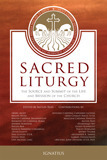
Sacra Liturgia 2013 explored questions of liturgical art, architecture, music, the ars celebrandi, the importance of ritual in human psychology, truly pastoral liturgy, the place of the older liturgical rites in the New Evangelization, liturgical formation, liturgical law, the role of the diocesan bishop in respect of the liturgy, and more.
“The Sacred Liturgy is not a hobby for specialists. It is central to all our endeavors as disciples of Jesus Christ. This profound reality cannot be over emphasized. We must recognize the primacy of grace in our Christian life and work, and we must respect the reality that in this life the optimal encounter with Christ is in the Sacred Liturgy,” explained Bishop Dominique Rey of Fréjus-Toulon, France, who opened the conference with these words.
Sacra Liturgia 2013 saw over three hundred delegates from over thirty countries listen to twenty leading liturgists, cardinals, bishops and other scholars—including Cardinals Burke and Ranjith, Archbishop Alexander Sample, Bishops Mark Aillet and Peter Elliott, Abbot Christopher Zielinski, Father U.M. Lang, Don Nicola Bux and Professor Tracey Rowland—emphasize the centrality of liturgical formation and celebration in the life and mission of the Church. “The New Evangelization must be founded on the faithful and fruitful celebration of the Sacred Liturgy as given to us by the Church in her tradition – Western and Eastern,” Bishop Rey asserted.
As the fruit of this conference Sacred Liturgy: The Source and Summit of the Life and Mission of the Church is an important resource in ongoing liturgical formation for clergy, religious and laity and makes a significant contribution to that renewal promoted in the Pontificate of Benedict XVI: a renewal which embraces the riches of liturgical tradition as valuable treasures, seeks to read the Second Vatican Council according to a hermeneutic of continuity, not rupture, and is in no doubt that, as Joseph Cardinal Ratzinger once wrote, “the true celebration of the Sacred Liturgy as the center of any renewal of the Church.”
About the Editor:
Dom Alcuin Reid is a monk of the Monastère Saint-Benoît in Fréjus-Toulon, France. He has lectured and has published extensively on the Liturgy, including The Organic Development of the Liturgy with a preface by Joseph Cardinal Ratzinger, and The Ceremonies of the Roman Rite Described.
Dom Alcuin Reid is available for interviews about this book. To request a review copy or an interview with Dom Alcuin Reid, please contact: Rose Trabbic, Publicist, Ignatius Press at (239) 867-4180 or rose@ignatius.com
The Confounding and Curious Pontifications of Cardinal Kasper
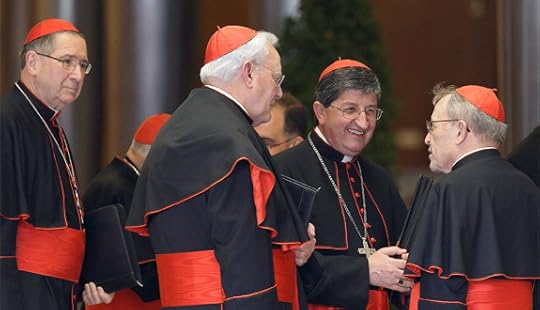
German Cardinal Walter Kasper, right, speaks with cardinals as they arrive for the afternoon session of a meeting with Pope Francis in the synod hall at the Vatican Feb. 21, 2014. Also pictured are Cardinals Roger M. Mahony, retired archbishop of Los Angeles, left, Carlos Amigo Vallejo, retired archbishop of Seville, Spain, and Giuseppe Betori of Florence. (CNS photo/Paul Haring)
The Confounding and Curious Pontifications of Cardinal Kasper | Carl E. Olson | Editorial | Catholic World Report
Is the German prelate and theologian promoting a book on mercy or pushing a dubious agenda at the expense of fellow bishops?
Cardinal Walter Kasper, noted German prelate and theologian, has been on a book tour in the States in support of his most recent work, Mercy: The Essence of the Gospel and the Key to Christian Life (Paulist Press). I'm not sure how much interest he has generated regarding his book, but In the course of just a few days, he has managed the rather remarkable (which is not to say admirable) combined feat of slighting the head of the Congregation of the Doctrine of the Faith (a fellow Cardinal, Gerhard Müller), essentially dismissing the pastoral authority of the USCCB, praising an openly dissenting theologian while positively comparing her to St. Thomas Aquinas—and doing so while talking of "humility" as if only he and a few others have even heard of it before.
Frankly, I'm aghast. I've never seen anything quite like it. Certainly not from someone of Cardinal Kasper's stature. And I've talked to several others in the past two days—all of them lifelong Catholics and all working in some capacity for the Church—and they say the same thing.
Cardinal Kasper's resume is undoubtedly impressive: he was president of the Pontifical Council for Promoting Christian Unity for almost a decade (2001-2010) after ten years as bishop of Rottenburg-Stuttgart (1989-1999). He has taught at several schools, including the University of Tubingen and the Catholic University of America. He has long had a reputation of being a "liberal"—although that is certainly relative—and he has had some interesting and high profile, um, discussions about various theological points over the years, as when he and then-Cardinal Joseph Ratzinger went round and round in 2001 about the nature and relationship of particular churches and the universal Church (see this ZENIT piece by Cardinal Avery Dulles for details and analysis).
He got back into the bigger spotlight in February, when he gave a two-hour-long address to an extraordinary consistory on the family at the Vatican, and was then praised for it by Pope Francis. But not everyone was so impressed. In fact, it soon became clear that many of those present were deeply critical of Kasper's ideas about how to better address the situation of Catholics who have been divorced and remarried. In late March, Edward Pentin reported:
May 8, 2014
A Really Funny Movie About Real Motherhood

A Really Funny Movie About Real Motherhood | Sarah Reinhard | CWR
Moms’ Night Out is a celebration of the everything that parenthood and family life is, including the chaos and the crazy and the comical
So, which of the following was true of the day I tried to sit down with my BFF and watch Moms’ Night Out?
A. I had a “moment” wherein I threw out my coffee, locked the bathroom door, and ignored the noise in the other room.
B. I texted said BFF and told her to forget it, because there was just no way I could endure the whining. (I didn’t specify if it was mine or theirs.)
C. I realized that I broke the screener and used up all my chances to watch the movie, thereby ruining all of our chances to even see the movie (and my shot at writing about it for the deadline I had).
D. My car broke down, people broke into my house, the kids ran around naked, and the internet was down.
The good news is that the answer is not “all of the above”—but just barely.
It was the perfect introduction to a movie that I’ve seen so hyped in my circles that I couldn’t decide if I really wanted to see it or if I would be vastly disappointed.
Within the first five minutes, I knew the answer, and it wasn’t disappointment.
May 6, 2014
Calling Men to Be Icons of God the Father
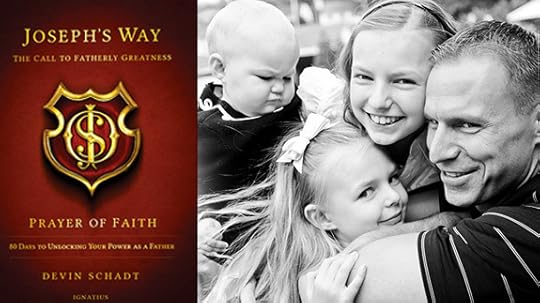
Calling Men to Be Icons of God the Father | Carl E. Olson | CWR
An interview with Devin Schadt, whose new book challenges men to recognize that fathers are not defined by their occupations but by their vocations
Devin Schadt is a husband, father, and speaker whose book, Joseph's Way: Prayer of Faith (80 Days to Unlocking Your Power as a Father) was recently published by Ignatius Press. The book is the first of a two-volume series that seeks to “transmit the message of the glory, necessity, and power of fatherhood.” Devin is the cofounder of the Fathers of St. Joseph, an apostolate that works for the renewal of authentic fatherhood, and he lives in the Midwest with his wife and five children. He recently corresponded with Carl E. Olson, editor of Catholic World Report, about the family as an icon of the Trinity, the example of St. Joseph, and how families goes the way of the father.
CWR: What was the inspiration, or origin, of Joseph’s Way: Prayer of Faith? How did your own experience as a Catholic, husband, and father shape this book and the second volume, Prayer of a King?
Devin Schadt: Joseph's Way was born out of crisis. Our third daughter, Anna Marie, was born at 28 weeks gestational period. After an emergency caesarian section, she spent a month in the Neonatal Intensive Care Unit in order to develop her lungs and digestive system, and eventually returned home with our family. After five days she contracted the respiratory syncytial virus (RSV), which is a type of cold that attacks premature infants’ lungs, often causing death. We readmitted Anna Marie to the pediatric unit at the local hospital, but the team was not equipped, nor did they have enough experience, to care for a child that small. Due to neglect, and ten hours of apnea, Anna Marie suffered a hypoxic event, wherein not enough oxygen was transmitted to her brain. By the time the Medivac team stabilized her on life support and she had arrived by helicopter at a children's hospital a couple of hours away, she had suffered three clinical death experiences and permanent brain injury.
Because of this, my wife implored me to discontinue my participation in youth ministry and to focus on being a husband and father. At that time, I viewed fatherhood as a second-rate vocation, not capable of fulfilling the great commission given by Christ in Matthew 28. In fact, I sensed that fatherhood was essentially a way to dismiss oneself from following Christ and becoming one of His disciples.
For years, I had lived in the tension of wanting to follow Christ, but also acknowledging that I was needed at home, and because of this I concluded that I was not called by God to be one of His followers. I went on a pilgrimage and confessed my interior struggles to one of the spiritual directors accompanying us. She said, "Go home and be Joseph." Those words initially crushed me. Couldn't she have said, "Go home and become St. Paul", or "Go home and start a mission"? Who was this St. Joseph, not a word of whose is recorded in Sacred Scripture, and who, in so much of Christian art, is depicted as lacking vitality and youth? St. Joseph appeared to be an extra, a tack-on, someone needed to "fill in" and make the Virgin's teenage pregnancy acceptable.
I went home and, being consecrated to Our Lady, asked her to introduce me to her "most chaste spouse"—and she did.
I started a writers’ group—not because I am a writer, but because my brother is an excellent writer, and had a couple of projects that he had been working on; I had hopes that the writers’ group would give him the accountability needed to complete his works. Each week, one of the members would share his latest writings. I was the odd man out, in that I was the only one among the men who was not a writer. When it was my turn to share, I would share brief reflections on fatherhood through the lens of St. Joseph. At one of these meetings, my friend (aptly named Joe) turned to me and said, "You are called to write on fatherhood through the lens of St. Joseph." His words resounded in my being. I was leaving for a four day retreat later that day, and by the time I had returned, God had given the entire outline for what originally constituted four books, which now comprise the two volumes of Joseph's Way.
I originally wrote Joseph's Way as a letter to myself, in hopes of discovering what it truly means to be a great father. Four books later, which now constitute two volumes, I sensed that God had given me something very special. Joseph's Way is unique, in that it provides a theological vision of fatherhood through the lens of St. Joseph. It is theological, yet practical—sometimes painfully practical. The books present a chronological, theological account of St. Joseph's life—from his first step to fatherly greatness, returning to his vocation after originally fleeing from it, and embracing his role as protector of woman, Mary, to his commissioning of Jesus to be built into a temple of sacrifice.
There are books written on the subject of fatherhood, and there are also books written on the subject of St. Joseph. But there are very few that offer an integration of fatherhood and St. Joseph in a practical, yet theological manner. Joseph's Way accomplishes this.
CWR: There are two sources, in particular, that inform Joseph’s Way: Sacred Scripture and the writings of St. John Paul II. Can you comment on the importance of both for your work and thought?
New: "Sacred Liturgy: The Source and Summit of the Life and Mission of the Church"
Now available from Ignatius Press:
Sacred Liturgy: The Source and Summit of the Life and Mission of the Church

Edited by Dom Alcuin Reid
"The Sacred Liturgy is not a hobby for specialists. It is central to all our endeavors as disciples of Jesus Christ. This profound reality cannot be over emphasized. We must recognize the primacy of grace in our Christian life and work, and we must respect the reality that in this life the optimal encounter with Christ is in the Sacred Liturgy."
With these words Bishop Dominique Rey of Fréjus-Toulon, France, opened Sacra Liturgia 2013, an international conference in which he brought together over twenty leading liturgists, cardinals, bishops and other scholars from around the world to emphasize the centrality of liturgical formation and celebration in the life and mission of the Church. "The New Evangelization must be founded on the faithful and fruitful celebration of the Sacred Liturgy as given to us by the Church in her tradition - Western and Eastern," Bishop Rey asserted.
Sacra Liturgia 2013 - the proceedings of which this book publishes - explored questions of liturgical art, architecture, music, the ars celebrandi, the importance of ritual in human psychology, truly pastoral liturgy, the place of the older liturgical rites in the New Evangelization, liturgical formation, liturgical law, the role of the diocesan bishop in respect of the liturgy, and more.
Sacred Liturgy - The Source and Summit of the Life and Mission of the Church is an important resource in ongoing liturgical formation for clergy, religious and laity, and makes a significant contribution to that renewal promoted in the Pontificate of Benedict XVI. That is the renewal which embraces the riches of liturgical tradition as valuable treasures, seeks to read the Second Vatican Council according to a hermeneutic of continuity, not rupture, and is in no doubt that, as Joseph Cardinal Ratzinger once wrote, "the true celebration of the Sacred Liturgy as the center of any renewal of the Church."
Dom Alcuin Reid is a monk of the Monastère Saint-Benoît in Fréjus-Toulon, France. He has lectured and has published extensively on the Liturgy, including The Organic Development of the Liturgy with a preface by Joseph Cardinal Ratzinger, and The Ceremonies of the Roman Rite Described.
Note: For more about the Sacra Litrugia 2013 conference, including information about speakers, see this 2013 interview with Dom Reid: "The Future of Liturgical Formation and Renewal" (www.CatholicWorldReport.com).
May 5, 2014
Card. Müller to LCWR leaders: Come back to "ecclesial center of faith" or be gone!

Left: Cardinal Gerhard Muller, prefect of the Congregation for the Doctrine of the Faith, at Pope Francis' celebration of Holy Thursday chrism Mass on April 17, 2014. (CNS photo/Paul Haring). Right: Sister Carol Zinn, the new president of LCWR, addresses the Leadership Conference of Women Religious Aug. 16, 2013, during its annual assembly in Orlando, Fla. (CNS photo/Roberto Gonzalez)
by Carl E. Olson | CWR Blog
Last August, I wrote a blog post, "O Sister, Where Art Thou? ", in which I stated:
The LCWR has long had an agenda of subverting Church authority and doctrine, and it has long used two simple tactics: ignore what Church leaders say and stall, stall, and stall. And, so far, it has worked. In addition, the leadership of the LCWR has long misused its authority and even misrepresented the positions of many of its members.
The subhead for that post, "After forty years of 'faithful dissent', the LCWR needs to go away'', summed up my stance fairly well. In short, like many Catholics, I'm quite tired of the endless chatting, and even coddling, that goes on with persons or groups who claim to be Catholic but who continually and consistently thumb their noses at Church teaching, practice, and authority—not just for a few years, but for a few decades!
It appears that Cardinal Gerhard Müller, head of the Congregation for the Doctrine of the Faith, is tiring of the nonsense as well. In a short but blunt April 30th address given to the Presidency of the Leadership Conference of Women Religious (LCWR), Müller zipped through the pleasantries and got down to business very quickly, focusing on two points of the contention: the LCWR leadership's objection that the CDF's April 2012 Doctrinal Assessment was too harsh and that it's finding were "unsubstantiated". Of the first, Card. Müller stated, in part:
Let me begin with the notion of “disproportionate sanctions.” One of the more contentious aspects of the Mandate—though one that has not yet been put into force—is the provision that speakers and presenters at major programs will be subject to approval by the Delegate. This provision has been portrayed as heavy-handed interference in the day-to-day activities of the Conference. For its part, the Holy See would not understand this as a “sanction,” but rather as a point of dialogue and discernment. It allows the Holy See’s Delegate to be involved in the discussion first of all in order to avoid difficult and embarrassing situations wherein speakers use an LCWR forum to advance positions at odds with the teaching of the Church. Further, this is meant as an assistance to you, the Presidency, so as to anticipate better the issues that will further complicate the relationship of the LCWR with the Holy See.
He then noted that the LCWR recently gave its "Outstanding Leadership Award" (see PDF on the LCWR site) to theologian Elizabeth A. Johnson, who, as I noted two years ago, "supported women's ordination in the 1970s and has challenged essential tenets of the Church's beliefs about Christ and salvation over the past three decades." Her 2011 book, Quest For the Living God, was strongly criticized by the USCCB, which published a 21-page critique, which stated that Johnson's book “contains misrepresentations, ambiguities, and errors that bear upon the faith of the Catholic Church as found in Sacred Scripture, and as it is authentically taught by the Church’s universal magisterium..." The USCCB then reaffirmed its criticisms in an October 2011 statement, saying, "The Committee comes to the conclusion that 'the language used in the book does not adequately express the faith of the Church.'"
In his address last week, Card. Müller said that the LCWR's recent honoring of Johnson "is a decision that will be seen as a rather open provocation against the Holy See and the Doctrinal Assessment. Not only that, but it further alienates the LCWR from the Bishops as well." Those are, without doubt, some pretty stern words. If the bishops and the LCWR have, for the past forty years, been involved in a sort of diplomatic dance, this remark, and the statement as a whole, marks a shot across the bow. Card. Müller then stated:
On Remembering What We Know: An Illuminating Life
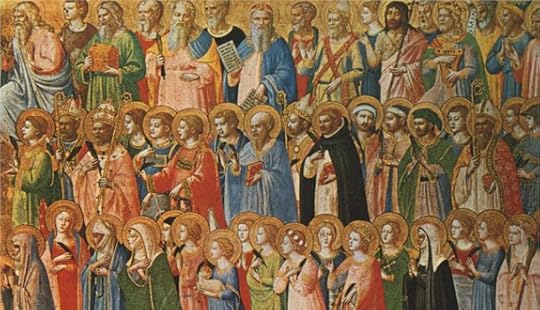
Detail from "Christ Glorified in the Court of Heaven" (1428) by Fra Angelico
On Remembering What We Know: An Illuminating Life | Fr. James V. Schall, SJ | CWR
The life and work of Fr. John Navone, SJ, has been devoted to truth, tradition, beauty, and the knowledge of God
Editor's Note: The following address was given on April 24th by Fr. James Schall at Gonzaga University (Spokane, WA), at the invitation of the school's Faith and Reason Institute, in honor of Fr. John Navone, SJ.
“Remembering one’s tradition is at the heart of both the Jewish and Christian identity. Israel’s remembering is essential for her continued existence as God’s covenant people, forgetting God’s saving acts would bring her destruction. ‘You shall remember the Lord your God…that he may confirm his covenant which he swore to your fathers, as at this day. And if you forget the Lord our God…I solemnly warn you that you shall surely perish’ (Deut. 8: 18-10). Through her remembering, Israel’s redemptive history continues in a living tradition where the divine commands perdures as historical events challenging successive generations to decision and that obedience which enables Israel to share in the redemption of here forefathers.”
— Fr. John Navone, SJ, “No Tradition, No Civilization”, Homiletic & Pastoral Review, October, 2002.
I.
The most memorable passage that I recall from many years of knowing Father John Navone, of corresponding with him, and of reading him is the following: “You are what you remember.” Whether this insightful sentence is unique to John Navone, I do not know, but he often used it. I have cited it many times myself, or, in a similar spirit: “Tell me what you remember, and I will tell you what you are.” From this angle of remembrance, I will approach my appreciation of John Navone’s work. “To remember” implies the existence of time and its passing-ness. From there it gets us to tradition and history.
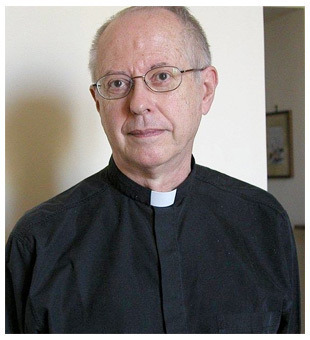
Fr. John Navone, SJ (David P. P. Persyn/Wikimedia Commons)
These considerations lead us, not to deadly “timelessness,” but rather to eternity, to the nuc stans, to the “now” that stands in hushed stillness, as Aquinas put it. The reason that the silence, the stillness, is hushed is because this is our first reaction to seeing something of immeasurable, or even measurable, beauty. Beauty is a prominent theme of John Navone. He talks about “remembering” because he thinks that something to remember is constantly before us. The classic definition of beauty was: Quod visum, placet—“What is seen or heard pleases us.” This capacity to be pleased by anything is one of the most curious things about us. We not only encounter lovely things, but they please us, delight us, as if we are made both to receive and to acknowledge the glory of what we have received, of what is not ourselves
In an article by Julie King in Spokane’s Spokesman-Review (June 21, 2008), Father Navone, recalling the Spokane part of his early education, remarked: “It was at Mt. St. Michael’s here in Spokane, with its superb instructors, that I began to study philosophy and learned about what I call ‘The Life of the Mind'.” In 2006, ISI Books published a book of Schall’s entitled, precisely: The Life of the Mind: On the Joys and Travails of Thinking.” I had no idea at the time that I was echoing John Navone, due, no doubt, to a loss of memory! But Navone was right. The instructors at Mt. St. Michaels in our time were superb. I was in the class ahead of John. I think of professors like Alexander Tourginy, Theodore Wolf, John Sullivan, Edward Morton, and especially Clifford Kossel, one of the best minds ever. We also had a good man we called “Machine Gun Ferretti”, who taught logic. He spoke so rapidly few besides the likes of John Navone could keep up with him.
One other passage from this Spokesman-Review column I would like to cite as indicative of Father Navone’s insights:
Carl E. Olson's Blog
- Carl E. Olson's profile
- 20 followers



